by Felipe Bueno | Mar 21, 2016 | Blog, events |
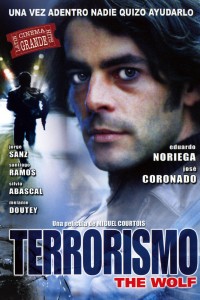 “El Lobo” is a film that beautifully melds together an artistic visual experience with a complicated, and multifaceted story about nationalism and moral ambiguity . The story involves a man, Txema, who is incredibly passionate towards his homeland – the Basque country – but due to some unforeseen circumstances he ends up being recruited by the Spanish government to infiltrate ETA. In the process he undergoes tribulations that cause him to lose his wife and question what it means to love his country. His journey makes him question exactly how far he is willing to go for his country, and he is ultimately forced to choose between what he believes is the lesser of two evils. On one hand, he must consider helping the nationalist terrorist organization ETA, whose goal is Basque independence, or the Spanish government, who wishes to suppress ETA for their own personal gain.
“El Lobo” is a film that beautifully melds together an artistic visual experience with a complicated, and multifaceted story about nationalism and moral ambiguity . The story involves a man, Txema, who is incredibly passionate towards his homeland – the Basque country – but due to some unforeseen circumstances he ends up being recruited by the Spanish government to infiltrate ETA. In the process he undergoes tribulations that cause him to lose his wife and question what it means to love his country. His journey makes him question exactly how far he is willing to go for his country, and he is ultimately forced to choose between what he believes is the lesser of two evils. On one hand, he must consider helping the nationalist terrorist organization ETA, whose goal is Basque independence, or the Spanish government, who wishes to suppress ETA for their own personal gain.
After being exposed to both sides of this war, Txema decides that the means by which ETA wishes to gain independence are too destructive and chooses to side with the Spanish government. He believes that the government wishes to put an end to the fighting for the good of the people. However, he soon finds out that the government wants to end the fighting only temporarily in order to be looked favorably upon by the international community. At this realization Txema’s world is shattered knowing that he was merely a puppet in a proxy war. After this he is hated by the members of ETA and forced to leave the Basque region, all while being dismissed by the Spanish police force. The movie’s tragic end highlights the futility of the conflict and demonstrates how people’s lives were ruined by violence on both sides.
by Borislava Manojlovic | Feb 3, 2016 | Blog, events, Research Team, Slideshow |
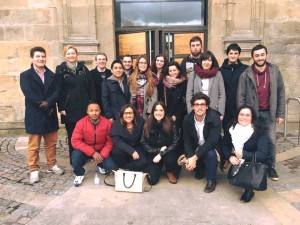 In January 2016, Dr. Borislava Manojlovic led a team of students in an immersive study abroad trip to the Basque Country, Spain. The course, titled “Memory and Conflict: Dealing with the Past Constructively,” allowed students to discover how different actors and institutions address processes of dealing with the region’s contentious past through education, justice, policymaking, and art.
In January 2016, Dr. Borislava Manojlovic led a team of students in an immersive study abroad trip to the Basque Country, Spain. The course, titled “Memory and Conflict: Dealing with the Past Constructively,” allowed students to discover how different actors and institutions address processes of dealing with the region’s contentious past through education, justice, policymaking, and art.
The Basque Country has experienced protracted conflict described as “Europe’s longest war” with roots that can be traced to the time of Spanish Civil War and before. The Basque Study Abroad trip explored the consequences of the conflict and steps that are being taken to help spur the reconciliation process.
(more…)
by Anna Guryanova | Oct 5, 2015 | Blog |
By Anna Guryanova
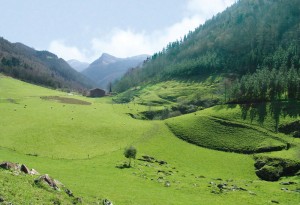 The Basque case is an example of how the new local approach to economic development can be a solution for overcoming economic challenges of a European state. Although the entire territory of Spain was heavily hit by 2008 economic crisis, the Basque country managed to secure its economic strength because of its human development approach. Amid negative economic conditions in Europe, Basque government advanced in foreign trade by increasing exports by 18% in the fourth quarter of 2014. Its industrial activity also rose, changing by 3% in January of 2015. Another determinant of its economic success includes better results in dealing with youth unemployment, which has tripled across Spain in seven years. The overall unemployment rate in Spain keeps its high-sky average, which also shows that economic crisis is not left behind yet. In the meanwhile Basque regional unemployment remains the lowest in Spain. Basque credit rating is also higher than the one of the central government of the country. And while Spain is struggling to maintain stable economic growth and overcome negative effects of the recent financial crisis, many argue that it needs the new model for its development.
The Basque case is an example of how the new local approach to economic development can be a solution for overcoming economic challenges of a European state. Although the entire territory of Spain was heavily hit by 2008 economic crisis, the Basque country managed to secure its economic strength because of its human development approach. Amid negative economic conditions in Europe, Basque government advanced in foreign trade by increasing exports by 18% in the fourth quarter of 2014. Its industrial activity also rose, changing by 3% in January of 2015. Another determinant of its economic success includes better results in dealing with youth unemployment, which has tripled across Spain in seven years. The overall unemployment rate in Spain keeps its high-sky average, which also shows that economic crisis is not left behind yet. In the meanwhile Basque regional unemployment remains the lowest in Spain. Basque credit rating is also higher than the one of the central government of the country. And while Spain is struggling to maintain stable economic growth and overcome negative effects of the recent financial crisis, many argue that it needs the new model for its development.
(more…)
by Thomas Hill | Sep 23, 2015 | Blog |
By Antton Maya
As the Srebrenica commemorations highlighted few weeks ago, it is obviously hard to deal with the past after a period of violence. Indeed, violent episodes generate storytelling clashes through the memory-making process, focusing on the need to build a pacific common space to share different sufferings and ensure a positive peace[1].
In the Basque Autonomous Community, the development of a memory-making process could be linked with a form of “post-transitional justice”[2]. This notion derives from the concept of transitional justice, which designs “the set of judicial and non-judicial measures that have been implemented by different countries in order to redress the legacies of massive human rights abuses”[3]. It is based on four pillars: the right to the truth, the right to justice, reparations and guarantees of non-recurrence. Thus the post-transitional justice deals with the implementation of these four pillars after a period of strong violence. For example, the trial in 2011 dealing with the ESMA in Argentina[4] could be analyzed as a form of post-transitional justice, as they occurred thirty years after the end of the military junta.
(more…)
by Borislava Manojlovic | Sep 23, 2015 | Blog |
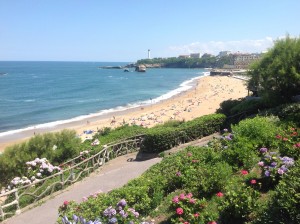 Traveling from the cool and cloudy Bilbao towards the sweltering heat of Barcelona, I feel a tinge of regret for the unseen, undiscovered, of inability to savor all the wonders of one place in a short period of time. In my mind’s eye, people and places I visited in the Basque country become alive.
Traveling from the cool and cloudy Bilbao towards the sweltering heat of Barcelona, I feel a tinge of regret for the unseen, undiscovered, of inability to savor all the wonders of one place in a short period of time. In my mind’s eye, people and places I visited in the Basque country become alive.
My travels first took me to sun-bathed Biarritz where easiness and quiet elegance, uninterrupted by the hassles of a big city, is a way of life. Then, to the picturesque neighboring villages of Saint Jean de Luz and Zokoa where the French Basque Coast has greeted me with a sharp contrast of blue Atlantic water, white houses and green hills so vividly colliding in a brilliant dance. In a conversation with a priest from Zokoa, Father Mikel, I heard a story of a tree representing Basque people for the first time. With a tear in his eye, Mikel talked about a perpetual struggle for dignity, the beauty of Basque language and its connection to the soul of the people and nature, ending his story with a simple statement: “Don’t cut the tree.”
(more…)
by Emily Green | Apr 27, 2015 | Blog |
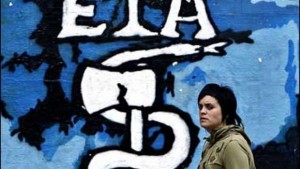 A woman’s role in peace and security has always been a topic of hot debate. After decades of victimization, the groundbreaking UN Security Council Resolution 1325 redefined the women’s role and welcomed a feminine approach to peace and mediation processes. The international community watched in awe as leaders like Liberia’s Leymah Gwobee proved that women possess both the agency and determination to make a difference in conflict resolution. In light of the 15th anniversary of Resolution 1325, a wealth of feminist literature has been created recognizing the role of women as harbingers of peace and justice. Governments and NGOs alike have conducted and published studies measuring the significant impact of the women, peace, and security global agenda. However, modern inquiries have historically neglected to question the portrayal of women combatants in armed conflict. Carrie Hamilton, in “The Gender Politics of Political Violence: Women Armed Activists in ETA”, offers an insightful exploration of active participation of women in armed conflict through a study of the Basque case. Hamilton traces a series of patterns throughout 4 decades of the organization’s activism to underline the misogynistic misrepresentation of women in armed conflict.
A woman’s role in peace and security has always been a topic of hot debate. After decades of victimization, the groundbreaking UN Security Council Resolution 1325 redefined the women’s role and welcomed a feminine approach to peace and mediation processes. The international community watched in awe as leaders like Liberia’s Leymah Gwobee proved that women possess both the agency and determination to make a difference in conflict resolution. In light of the 15th anniversary of Resolution 1325, a wealth of feminist literature has been created recognizing the role of women as harbingers of peace and justice. Governments and NGOs alike have conducted and published studies measuring the significant impact of the women, peace, and security global agenda. However, modern inquiries have historically neglected to question the portrayal of women combatants in armed conflict. Carrie Hamilton, in “The Gender Politics of Political Violence: Women Armed Activists in ETA”, offers an insightful exploration of active participation of women in armed conflict through a study of the Basque case. Hamilton traces a series of patterns throughout 4 decades of the organization’s activism to underline the misogynistic misrepresentation of women in armed conflict.
(more…)
 “El Lobo” is a film that beautifully melds together an artistic visual experience with a complicated, and multifaceted story about nationalism and moral ambiguity . The story involves a man, Txema, who is incredibly passionate towards his homeland – the Basque country – but due to some unforeseen circumstances he ends up being recruited by the Spanish government to infiltrate ETA. In the process he undergoes tribulations that cause him to lose his wife and question what it means to love his country. His journey makes him question exactly how far he is willing to go for his country, and he is ultimately forced to choose between what he believes is the lesser of two evils. On one hand, he must consider helping the nationalist terrorist organization ETA, whose goal is Basque independence, or the Spanish government, who wishes to suppress ETA for their own personal gain.
“El Lobo” is a film that beautifully melds together an artistic visual experience with a complicated, and multifaceted story about nationalism and moral ambiguity . The story involves a man, Txema, who is incredibly passionate towards his homeland – the Basque country – but due to some unforeseen circumstances he ends up being recruited by the Spanish government to infiltrate ETA. In the process he undergoes tribulations that cause him to lose his wife and question what it means to love his country. His journey makes him question exactly how far he is willing to go for his country, and he is ultimately forced to choose between what he believes is the lesser of two evils. On one hand, he must consider helping the nationalist terrorist organization ETA, whose goal is Basque independence, or the Spanish government, who wishes to suppress ETA for their own personal gain.
 In January 2016, Dr. Borislava Manojlovic led a team of students in an immersive study abroad trip to the Basque Country, Spain. The course, titled “Memory and Conflict: Dealing with the Past Constructively,” allowed students to discover how different actors and institutions address processes of dealing with the region’s contentious past through education, justice, policymaking, and art.
In January 2016, Dr. Borislava Manojlovic led a team of students in an immersive study abroad trip to the Basque Country, Spain. The course, titled “Memory and Conflict: Dealing with the Past Constructively,” allowed students to discover how different actors and institutions address processes of dealing with the region’s contentious past through education, justice, policymaking, and art.

